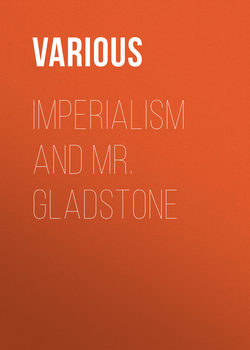Читать книгу Imperialism and Mr. Gladstone - Various - Страница 2
PURCHASE OF THE SUEZ CANAL SHARES (1876)
ОглавлениеSource.—Hansard, Third Series, vol. 227, col. 95 (Debate on the Address, February, 1876)
Mr. Disraeli: … When we acceded to office two years ago an International Commission had only just ceased its labours at Constantinople upon the dues of the Suez Canal, and upon the means of ascertaining and maintaining a limit of them, and it had arrived at reasons entirely protested against by the proprietary. What was the state of affairs there? Lord Derby had to deal with them. The proprietary of the canal threatened, and not only threatened, but proceeded, to stop the canal. They refused pilots; they threatened to change the signals; they took steps which would have interrupted that mode of intercourse with India… From that moment it became a matter of interest to those responsible for the government of this country to see what could be done to remedy those relations with the Suez Canal… But it suddenly comes to our knowledge that the Khedive, on whose influence we mainly depended, is going to part with his shares. We received a telegram from Cairo informing us that the Khedive was anxious to raise a considerable sum of money upon his shares in the Suez Canal, and offered them to England. We considered the question immediately, and it appeared to us to be a complicated transaction – one to which there were several objections; and we sent back to say that we were favourably disposed to assist the Khedive, but that at the same time we were only prepared to purchase the shares outright. What was the answer? The answer was that the Khedive was resolved, if he possibly could, to keep his shares, and that he could only therefore avail himself of a loan. There matters seemed to end. Then suddenly there came news to the Government of this country that a French society – Société Générale – was prepared to offer the Khedive a large sum of money – very little inferior to the four millions – but on very onerous conditions. The Khedive communicated with us, and said that the conditions were so severe that he would sooner sell the shares outright, and – which I had forgotten to mention – that, in deference to his promise that England should always have the refusal of the shares if he decided to sell them, he offered them to the English Government. It was absolutely necessary to decide at that moment what course we should take. It was not a thing on which we could hesitate… To pretend that Lord Derby has treated this business as a mere commercial speculation is idle. If he did not act in accordance with the principles of high policy, I should like to know what high policy is, and how a man can pursue it.
Apart from looking upon this as an investment, if the shares had been offered, and if there had been no arrangement of paying interest for nineteen years, so far as I am concerned, I should have been in favour of the purchase of the shares. I should have agreed with Lord Derby in thinking that England would never be satisfied if all the shares of the Suez Canal were possessed by a foreign company. Then it is said, if any obstacles had been put in your way by the French proprietors of the canal, you know very well that ultimately it must come to force, and you will then obtain at once the satisfaction of your desire. Well, if the government of the world was a mere alternation between abstract right and overwhelming force, I agree there is a good deal in that observation; but that is not the way in which the world is governed. The world is governed by conciliation, compromise, influence, varied interests, the recognition of the rights of others, coupled with the assertion of one's own; and, in addition, a general conviction, resulting from explanation and good understanding, that it is for the interests of all parties that matters should be conducted in a satisfactory and peaceful manner… I cannot doubt that the moral influence of England possessing two-fifths of the shares in this great undertaking must have made itself felt, must have a considerable influence upon the conduct of those who manage the company… England is a Mediterranean Power; a great Mediterranean Power. This is shown by the fact that in time of war always, and frequently in time of peace, she has the greatest force upon those waters. Furthermore, she has strongholds upon those waters which she will never relinquish. The policy of England, however, is not one of aggression. It is not provinces she wants. She will not interest herself in the redistribution of territory on the shores of the Mediterranean, as long as the redistribution does not imperil the freedom of the seas and the dominion which she legitimately exercises. And therefore I look upon this, that in the great chain of fortresses which we possess, almost from the Metropolis to India, that the Suez Canal is a means of securing the free intercourse of the waters, is a great addition to that security, and one we should prize.
